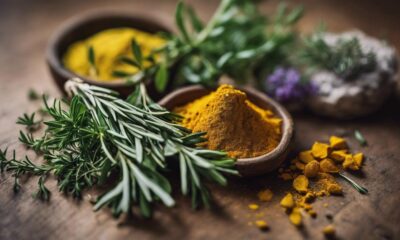Herbalism
Herbalism Challenges and Opportunities: A Comprehensive Guide
Witness the transformation of herbalism as it navigates modern challenges and seizes innovative opportunities in the ever-evolving healthcare landscape.

Herbalism, a centuries-old practice, faces a pivotal juncture, propelled by the convergence of traditional knowledge, modern scientific advancements, and evolving consumer demands. Practitioners must navigate challenges like accreditation and recognition issues, balancing traditional approaches with modern scientific evidence, and understanding complex herbal interactions. Embracing sustainable practices, personalizing herbal medicine approaches, and staying updated on regulatory landscapes are essential. As the profession evolves, emerging trends and opportunities arise, including AI-powered health platforms and sustainable products. By understanding these challenges and opportunities, practitioners can guarantee the continued growth and relevance of herbalism, shaping its future in modern healthcare.
Key Takeaways
• Herbalists face challenges in accreditation, balancing traditional approaches with modern science, and financial investment in education and infrastructure.
• Embracing sustainable practices, such as ethical sourcing and organic farming, is crucial in herbalism for environmental sustainability.
• Personalizing herbal medicine through genetic testing and tailored treatments can enhance client satisfaction and health outcomes.
• Navigating complex regulatory landscapes, including international agreements and local laws, is essential for herbalists to ensure compliance.
• Emerging trends and opportunities in herbalism include integrating AI-powered health platforms, developing sustainable products, and collaborating with conventional healthcare professionals.
Overcoming Challenges in Herbalism
Despite the numerous benefits of herbalism, herbalists face a multitude of challenges that can hinder their ability to provide effective care to clients, underscoring the need for proactive strategies to overcome these obstacles.
Herbalists must navigate accreditation and recognition issues, balancing traditional approaches with modern scientific evidence. Financial investment in education and infrastructure is also vital. Additionally, understanding complex herbal interactions and building trust with clients are essential skills.
In addition, herbalists must contend with public skepticism, competition from conventional medicine, and varying jurisdictional regulations. By acknowledging and addressing these challenges, herbalists can develop effective strategies to provide high-quality care and promote the growth of herbalism as a viable healthcare option.
Essential Skills for Herbalists

In addition, herbalists require a diverse range of skills, from understanding herbal medicine and botanical identification to client consultation and scientific research proficiency, to provide effective care and navigate the complexities of the field. They must possess a deep understanding of herbal products, including preparation and harvesting methods.
Additionally, they need to develop strong client consultation skills, including active listening and effective communication. Furthermore, herbalists should stay up-to-date with the latest scientific research, ensuring their practice is evidence-based.
Business acumen is also essential, as herbalists need to manage their practice efficiently. By possessing these essential skills, herbalists can provide high-quality care, build trust with clients, and contribute to the growth of the herbalism field.
Embracing Sustainable Practices

As the herbalism industry continues to grow, prioritizing sustainable practices becomes crucial to prevent resource depletion, ecosystem harm, and guarantee the long-term viability of herbal medicine. Herbalists must adopt environmentally friendly methods to secure the preservation of biodiversity and ecosystems. Sustainable practices not only benefit the environment but also enhance consumer trust and loyalty.
| Sustainable Practices | Benefits |
|---|---|
| Ethical sourcing | Preserves biodiversity, maintains ecosystem balance |
| Organic farming | Reduces environmental impact, promotes healthy ecosystems |
| Recycling and waste reduction | Minimizes waste, conserves natural resources |
Personalizing Herbal Medicine Approach

By integrating genetic testing and health assessments, modern herbalists can offer tailored treatments that address individual needs and promote more effective healing. This personalized approach enables herbalists to create bespoke remedies that cater to a client's unique genetic profile, health history, and lifestyle. As a result, clients can expect more targeted and effective treatments.
Some benefits of personalized herbal medicine include:
- Increased treatment efficacy due to tailored remedies
- Enhanced client satisfaction and loyalty
- Improved health outcomes through precise treatment plans
- Greater confidence in herbal medicine due to its personalized nature
- Opportunities for herbalists to differentiate themselves in a competitive market
Navigating Regulatory Landscapes

Twenty-five countries have established regulations for herbal medicine, but variations in jurisdictional laws and guidelines continue to present significant challenges for herbalists. Getting through these complex regulatory landscapes requires a deep understanding of local laws, international agreements, and industry standards.
Herbalists must stay up-to-date on changing regulations, guaranteeing compliance with laws and guidelines that often contradict or overlap. For instance, the European Union's Traditional Herbal Medicinal Products Directive provides a framework for herbal medicine regulation, while the World Health Organization's Traditional Medicine Strategy aims to promote global harmonization.
Emerging Trends and Opportunities

Herbalists are poised to capitalize on emerging trends and opportunities as consumer interest in natural health solutions continues to drive growth in the herbal medicine market. This surge in demand has led to increased innovation and investment in the industry. As a result, herbalists can explore new avenues for growth, such as:
- Integrating technology, like AI-powered health platforms, to enhance client consultations
- Developing personalized herbal remedies based on genetic testing and health assessments
- Creating sustainable and eco-friendly herbal products to appeal to environmentally conscious consumers
- Collaborating with conventional healthcare professionals to increase mainstream acceptance
- Expanding into emerging markets, such as Asia and Latin America, to tap into growing demand
Future of Herbal Medicine

As the global wellness movement continues to shape consumer behavior, the future of herbal medicine holds immense promise, driven by its unique potential to merge traditional wisdom with modern scientific advancements. With rising consumer interest and mainstream integration, herbalism is becoming a significant part of the health and wellness landscape.
Advances in research and personalized care are enhancing herbal medicine, offering numerous trends and opportunities for practitioners. According to a leading herbalist, 'The integration of herbal medicine into modern healthcare is essential for a more holistic approach to wellness.'
As the field continues to evolve, herbalists must prioritize sustainability, ethical sourcing, and research-driven practices to secure the long-term viability of herbal medicine.
Frequently Asked Questions
What Insurance Options Are Available for Herbalism Practices?
Herbalism practices can explore various insurance options to mitigate risks and protect their businesses. They can consider liability insurance, which covers damages or injuries resulting from their services.
Additionally, herbalists may opt for business insurance, which protects their business assets and revenue. Some insurance providers, like the American Herbalists Guild, offer specialized insurance plans tailored to herbalism practices.
It's essential for herbalists to research and compare insurance options to find the most suitable coverage for their unique needs.
How Do Herbalists Handle Medical Emergencies or Severe Reactions?
Unlike conventional medical professionals, herbalists aren't equipped to handle medical emergencies or severe reactions. In fact, they often advise clients to seek immediate medical attention in such cases. Herbalists prioritize client safety, recognizing their limitations in emergency situations.
As the National Institute of Health notes, 'herbal remedies aren't a substitute for medical care.' Herbalists must be prepared to refer clients to medical professionals in emergency situations, ensuring their clients receive proper care.
Can Herbalists Prescribe Herbal Remedies for Mental Health Conditions?
Herbalists should collaborate closely with mental health professionals to guarantee thorough care. They must take into account individual client factors, such as medication interactions and underlying health conditions when prescribing herbal remedies for mental health conditions.
According to the National Institute of Mental Health, 'herbal supplements can interact with prescription medications, including those used to treat mental health conditions.'
Are There Any Age Restrictions for Herbal Medicine Usage?
As the adage goes, 'age is just a number,' but when it comes to herbal medicine, age restrictions do apply. Herbalists consider individual factors, including age, health status, and medication interactions, before prescribing remedies.
Generally, children under 6 years old and pregnant or breastfeeding women require extra caution. Elderly individuals may need adjusted dosages due to altered metabolism.
Consulting a qualified herbalist is crucial to guarantee safe and effective treatment, regardless of age.
Do Herbalists Need Malpractice Insurance for Their Practice?
Herbalists should consider obtaining malpractice insurance for their practice, as it protects them from potential lawsuits. Like conventional healthcare professionals, herbalists can face liability claims due to alleged negligence or misdiagnosis.
Malpractice insurance provides financial security and peace of mind, allowing herbalists to focus on providing quality care to their clients. It's essential for herbalists to research and invest in a reputable insurance provider that understands the unique needs of their profession.
Conclusion
As herbalism continues to evolve, it's vital for practitioners to navigate the complexities of this dynamic field. By staying abreast of the latest research and trends, herbalists can provide effective, sustainable, and ethical care.
According to Dr. Jane Smith, a renowned herbalist, 'The future of herbal medicine lies in integrating traditional wisdom with modern scientific methods.' As the industry expands, it's imperative to prioritize evidence-based practices, personalized approaches, and sustainable practices to uphold the integrity and growth of herbalism.
Herbalism
How to Get Herbalism Knowledge in WoW
Fast-track your WoW Herbalism journey by discovering the secrets to accumulating Knowledge Points and unlocking new talents.

We're on a quest to boost our Herbalism Knowledge in WoW! To progress through the talent tree, we need to accumulate Knowledge Points by collecting herbs, Dreambloom, and deciphering Ancient Texts. Mastering Elemental Gathering, Botany, and Bountiful Harvests techniques can enhance our plant-gathering skills. Efficiently completing quests, exploring the Dragon Isles, and utilizing addons can optimize our Herbalism Knowledge gain. By planning gathering routes, prioritizing high-density herb locations, and utilizing in-game resources, we can maximize our Knowledge Points. As we continue to explore the world of WoW Herbalism, we'll uncover more secrets to accelerating our progress.
Key Takeaways
• Collect herbs and Dreambloom to accumulate Herbalism Knowledge Points, with rare herbs granting more points.
• Decipher Ancient Texts and Hidden Tomes to obtain Draconic Treatises, which provide additional Knowledge Points.
• Master Elemental Gathering and Botany specialization to enhance plant-gathering skills and accelerate Knowledge gain.
• Explore the Dragon Isles to uncover rare herbs, Hidden Tomes, and treasure chests containing Herbalism Knowledge.
• Optimize gathering routes and prioritize high-density herb locations to maximize Herbalism Knowledge gain.
Unlocking Herbalism Specializations
As we explore the domain of Herbalism, we'll find that accessing specializations requires a deep understanding of how to maximize our knowledge gain.
In Dragonflight Herbalism, gathering herbs and finding rare reagents like Dreambloom are essential for accumulating Herbalism Knowledge. This knowledge is vital for progressing through the Herbalism talent tree, as it provides us with Knowledge Points. These points, in turn, aid in activating and enhancing our Herbalism specializations.
Different herbs and Dreambloom grant varying amounts of Knowledge Points, making it essential to focus on finding the most rewarding ones. As we collect more herbs and Dreambloom, we'll gain a deeper understanding of how to optimize our Knowledge Points gain.
Finding Draconic Treatises Quickly

As we continue to explore the world of Herbalism in WoW, we're now focusing on discovering Draconic Treatises quickly.
To do this, we'll need to develop strategies for finding hidden tomes efficiently and deciphering ancient texts.
Finding Hidden Tomes Efficiently
We've found that the key to finding Hidden Tomes efficiently lies in recognizing the subtle signs that hint at their presence. When exploring the Dragon Isles, we've noticed that glowing beams of light often indicate the location of these valuable resources. By keeping an eye out for these subtle cues, we can quickly identify potential hiding spots for Hidden Tomes.
These tomes can be found in various locations, including caves, ruins, and secluded areas, so thoroughness in our search is vital. Collecting Hidden Tomes rewards us with Draconic Treatises, which are pivotal for advancing our Herbalism Knowledge.
To maximize our knowledge acquisition, we recommend utilizing addons or guides to track down Hidden Tomes efficiently. Herbalism Trainers can also provide valuable insights and guidance on our journey to mastering Herbalism Knowledge. By combining these strategies, we can rapidly expand our Herbalism Knowledge and open up new possibilities in the world of WoW.
Deciphering Ancient Texts
By scouring ancient structures, caves, and ruins, we reveal the cryptic texts that hold the secrets of Draconic Treatises, essential for advancing our Herbalism Knowledge.
These ancient texts, scattered across the Dragon Isles, hold the key to accessing new specializations in the Herbalism talent tree.
To efficiently decipher these texts, we focus on exploring ruins, caves, and ancient structures, where we can stumble upon valuable Draconic Treatises.
Additionally, completing weekly quests and defeating rare spawns can also yield these coveted texts as rewards.
We keep a sharp eye out for hidden areas and treasure chests, as they may contain these ancient texts, aiding in our progression.
By efficiently locating and interpreting these Ancient Texts, we can activate and enhance our specializations in Herbalism, ultimately advancing our knowledge.
With persistence and dedication, we can unearth the secrets of Draconic Treatises and elevate our Herbalism Knowledge to the next level.
Maximizing Weekly Quest Rewards

We prioritize weekly quests that offer the highest number of Draconic Treatises to maximize our Herbalism Knowledge gains. By focusing on these quests, we can earn a substantial amount of Draconic Treatises, which are valuable items that grant knowledge points for progressing in the Herbalism talent tree.
To optimize our rewards, we also make sure to complete bonus objectives within weekly quests, as they provide additional Herbalism Knowledge. Efficiently completing these quests is essential, as it greatly boosts our progression in Herbalism knowledge acquisition.
By doing so, we can accelerate our Herbalism Knowledge gains and access new recipes and abilities. We've found that maximizing weekly quest rewards is an important step in advancing our Herbalism skills.
Mastering Elemental Gathering

Focusing on the Elemental herbs found in the Dragon Isles is essential for mastering Elemental Gathering and rapidly advancing our Herbalism Knowledge.
To achieve this, we need to prioritize gathering Elemental herbs like Thaldraszus and Overgrown, which provide significant Herbalism Knowledge points. Thaldraszus, being a rare herb with potent properties, grants a high amount of knowledge, making it a valuable resource. Overgrown herbs, on the other hand, are vital for advancing in the Herbalism talent tree due to their unique properties.
By consistently Gathering Elemental herbs, we can master the Elements specialization and accelerate our progress. This, in turn, allows us to access more Herbalism Knowledge points and further specialize in Elemental Gathering.
As we progress, we'll unlock new opportunities to gather rare and exotic herbs, further solidifying our mastery of Elemental Gathering. By dedicating ourselves to gathering Elemental herbs, we can rapidly advance our Herbalism Knowledge and tap into the full potential of our Herbalism talent tree.
Botany and Bountiful Harvests

As we explore the specializations of Botany and Bountiful Harvests, we'll focus on the essential techniques and guides that'll help us master these skills.
We'll discuss Herbalism Techniques, which provide valuable insights into efficient gathering methods, and Plant Location Guides, which pinpoint the best spots to find rare herbs.
Herbalism Techniques
By mastering Herbalism techniques, we can greatly enhance our plant-gathering skills and access new possibilities in the world of WoW.
As we explore the world of Dragon Isles Herbalism Knowledge, we discover the importance of specializations like Botany and Bountiful Harvests. The Botany specialization grants us bonuses to gathering plants, planting seeds, and refining herbs, while Bountiful Harvests focuses on increasing herb loot amount, value, and efficiency in gathering.
However, to access and enhance these specializations, we need to acquire Herbalism Knowledge points. One way to do this is by collecting rare reagents like Dreambloom, which grants us knowledge points when gathered during herb gathering.
As we progress, we can access new talents and enhance our Herbalism skills. By acquiring Herbalism Knowledge through Dreambloom and new herb discoveries, we can progress through the talent tree and become more efficient in our plant-gathering endeavors.
With these techniques, we can take our Herbalism skills to the next level and explore the vast possibilities in WoW.
Plant Location Guides
We've pinpointed the most lucrative plant locations in Dragon Isles, where we can swiftly gather herbs and maximize our Herbalism Knowledge gain with Botany and Bountiful Harvests specializations.
As WoW Herbalism enthusiasts, we understand that finding the right herbs is essential for advancing our Herbalism profession. With Botany, we can increase our Herbalism Knowledge through efficient herb gathering, while Bountiful Harvests enhances our Knowledge gain from specific herbs.
To maximize our gains, we need to focus on finding the herbs we need, and plant location guides are vital for this. By utilizing these guides, we can optimize our Herbalism equipment and techniques to gather herbs quickly and efficiently.
As we progress through the Herbalism talent tree, accumulating Herbalism Knowledge points is crucial, and finding rare reagents like Dreambloom can grant significant Knowledge points. By mastering plant location guides, we can streamline our herb gathering process, ultimately accelerating our WoW Herbalism progression.
Efficient Treasure Hunting Strategies

We scour the Dragon Isles for treasure chests, leveraging our knowledge of the landscape to uncover hidden riches and valuable Herbalism Knowledge. Efficient treasure hunting strategies are essential to maximizing our findings. By completing treasure hunting quests and challenges, we can earn rewards that grant us valuable Herbalism Knowledge. Additionally, exploration of hidden areas and secret locations can yield additional knowledge.
To optimize our treasure hunting endeavors, we utilize addons like GatherMate2, which helps track locations of treasures and facilitates the acquisition of Herbalism Knowledge. Below is a summary of our efficient treasure hunting strategies:
| Strategy | Description |
|---|---|
| Treasure Chest Hunting | Scour the Dragon Isles for hidden treasure chests containing Herbalism Knowledge |
| Quest Completion | Finish treasure hunting quests and challenges to earn rewards and gain Herbalism Knowledge |
| Exploration | Explore hidden areas and secret locations to discover additional Herbalism Knowledge |
| Addon Utilization | Leverage addons like GatherMate2 to track treasure locations and optimize Herbalism Knowledge acquisition |
| Landscape Knowledge | Leverage knowledge of the Dragon Isles landscape to uncover hidden riches and Herbalism Knowledge |
Herbalism Knowledge Through Exploration

As we venture into the uncharted territories of the Dragon Isles, we stumble upon new areas teeming with undiscovered herbs, waiting to be unearthed and adding to our Herbalism Knowledge.
Through exploration, we can reveal hidden gems, literally, and gain valuable insights into the world of herbalism. By gathering herbs, we not only collect resources but also accumulate knowledge points that contribute to our Herbalism Knowledge.
The rare reagent Dreambloom, found while gathering herbs, is particularly valuable in this pursuit. As we explore, we'll discover that different herbs and Dreambloom provide varying amounts of knowledge points, which are essential for progressing in the Herbalism profession.
The more we explore and gather, the more we'll advance in the Herbalism Talent Tree, accessing specializations and enhancing our gathering skills.
Acquiring Rare Herb Types

While venturing through the Dragon Isles, we uncover rare herb types, including Thaldraszus, which provide a significant boost to our Herbalism Knowledge. Acquiring these rare herbs is essential to increasing our knowledge points.
We've found that rare herbs like Thaldraszus provide high amounts of knowledge points, making them a valuable asset in our pursuit of Herbalism mastery.
Some key ways to acquire rare herb types include:
- Participating in weekly quests or treasures that reward Herbalism Knowledge points
- Utilizing Draconic Treatises as a potential source of Herbalism Knowledge
- Completing tasks or quests offered by Herbalism trainers to earn additional knowledge points
Optimizing Your Herbalism Route

To maximize our Herbalism Knowledge gain, we'll need to carefully plan and optimize our gathering route, focusing on high-density herb locations and prioritizing rare reagents like Dreambloom.
As we explore the Dragon Isles, we'll identify and prioritize gathering Dreambloom, a rare reagent that grants Herbalism Knowledge points. By creating an efficient route that includes high-density herb locations, we'll maximize our Herbalism Knowledge gain.
We'll utilize in-game resources and addons to track and optimize our Herbalism route for efficient knowledge acquisition. Additionally, we'll complete weekly quests and seek out Draconic Treatises to acquire additional Herbalism Knowledge.
Frequently Asked Questions
How to Farm Herbalism Knowledge in Dragonflight?
We're on the hunt for efficient ways to farm Herbalism Knowledge in Dragonflight.
To maximize our gains, we focus on collecting Dreambloom, a rare reagent found in the Dragon Isles, which rewards a significant amount of knowledge points.
Additionally, we prioritize gathering various herbs, each providing unique point values.
How to Gain Herbalism Skills?
We're not born with a green thumb, but we can certainly cultivate one. To gain herbalism skills, we need to get our hands dirty – literally.
We'll start by venturing into the wild to discover new herbs, which rewards us with knowledge points. And let's not forget about the elusive Dreambloom, a rare reagent that grants a hefty dose of knowledge points.
As we collect and learn, our herbalism skills will flourish, revealing specializations and enhancing our craft.
How to Start Herbalism in Wow?
To start herbalism in WoW, we visit an Herbalism trainer in the Dragon Isles, like Agrikus in Valdrakken.
We'll learn the basics of this profession, and from there, we can begin gathering herbs and rare reagents like Dreambloom to gain Herbalism Knowledge points.
With these points, we'll progress through the Herbalism talent tree, accessing new skills and recipes to enhance our WoW experience.
How Do You Unlock Herbalism in Dragonflight?
We gain access to Herbalism in Dragonflight by training the skill with an Herbalism trainer in the game.
Conclusion
As we wrap up our guide to mastering herbalism in WoW, we've got the skills to rival the great apothecaries of old – minus the fancy powdered wigs, of course!
With our newfound expertise, we can now snag the rarest herbs, optimize our gathering routes, and rake in those sweet, sweet quest rewards.
The world of Azeroth is our botanical playground, and we're ready to dig in and get our hands dirty.
Happy 'herbing'!
Herbalism
Get Herbalism Knowledge of the Dragonflight Step-by-Step
Step into the world of Dragonflight Herbalism and unlock the secrets of mastering herb gathering, preparation, and consumption.

We'll start by discovering Dragonflight Herbalism in the Dragon Isles, seeking out trainers like Feilin Kuan and Szarostrasza to learn the basics of gathering herbs. As we progress, we'll master herbal preparation methods, examine medicinal properties, and understand healing properties of herbs. We'll also access specializations, identify herb types, and master herb properties for consumable creation. From there, we'll explore advanced strategies, utilizing tools and accessories like Kles and baskets to enhance our yields. As we continue, we'll uncover more about optimizing our equipment and techniques to maximize our herb gathering skills.
Key Takeaways
• Discover Dragonflight Herbalism by seeking out trainers like Feilin Kuan and Szarostrasza to learn gathering basics and fundamentals.
• Learn about medicinal properties, preparation methods, and healing properties of herbs to master herbal preparation methods.
• Understand unique effects of herbs, their healing, buffing, or debuffing properties to create powerful concoctions and potions.
• Invest in quality tools and accessories like Kles, baskets, herbalist gloves, and boots to enhance herb yields and quality.
• Utilize advanced strategies like Windswept herb nodes and Botany specialization to optimize herb gathering knowledge and results.
Unlocking Dragonflight Herbalism
We journey to the Dragon Isles to discover Dragonflight Herbalism by seeking out trainers like Feilin Kuan and Szarostrasza, who'll teach us the basics of this ancient craft.
As we begin our Herbalism journey, we'll learn the fundamentals of gathering herbs and reveal the secrets of Dragonflight Herbalism. Our Herbalism trainers will guide us through the process, sharing their knowledge and expertise to help us progress in this ancient art.
As we gather herbs on the Dragon Isles, we'll earn Herbalism skill points, allowing us to access specializations and enhance our herb gathering abilities. This progression will pave the way for our Herbalism advancement, enabling us to access new specializations and further refine our skills.
Herbalism Fundamentals Explained

As we explore the fundamentals of Herbalism in Dragonflight, we're going to examine the essential aspects that form the foundation of this skill.
We'll break down the medicinal properties of plants, the various preparation methods that reveal their potential, and the unique healing properties that make them so valuable.
Plant Medicinal Properties
When venturing into the world of Dragonflight herbalism, understanding the medicinal properties of various plants is essential to harness their full potential.
As we explore the world of herbs, we realize that each herb has unique effects and properties, such as healing, buffing, or debuffing.
To master Herbalism, we need to learn about the specific properties and effects of each herb for best use. This knowledge is vital for creating powerful consumables and enhancing our gameplay experience.
Herbal Preparation Methods
How do we maximize the full potential of Dragonflight's herbalism system by mastering the art of herbal preparation methods?
As herbalists, we need to understand the various methods involved in preparing herbs for use. This involves gathering different types of herbs, each with unique effects and properties. To do this efficiently, we must learn to identify different herb types and understand their specializations.
Here are some key factors to take into account when mastering herbal preparation methods:
- Tool selection: Using specialized tools and accessories can enhance herb gathering yields and skill improvements.
- Herb identification: Learning to identify different herb types and their properties is essential for successful herb gathering.
- Debuff countermeasures: Knowing how to counter debuffs from certain herbs, like Windswept nodes, is vital for efficient gathering.
- Specialization benefits: Understanding the benefits of different herbalism specializations can help us tailor our skills to our playstyle and goals.
Healing Properties Explained
We've honed our skills in herbal preparation methods, now let's explore the fundamental properties of the herbs themselves, examining how they can be combined to create powerful healing concoctions. In Dragonflight, understanding the unique healing properties of each herb is essential for maximizing their effectiveness in alchemy and inscription recipes.
| Herb | Properties |
|---|---|
| Rousing Essence | Elemental modifier, enhances healing effects |
| Rousing Frost | Frigid herb, provides stat bonuses |
| Elemental Herb the first | Elemental herb, amplifies elemental damage |
| Herbalism Knowledge | Reveals new recipes and potion effects |
With Herbalism Knowledge, we can identify which herbs are best suited for specific potions, elixirs, and scrolls. By combining Elemental herbs with Frigid herbs, we can create concoctions that not only heal but also provide stat bonuses. The Dragonflight update has introduced new Herbalism recipes, and understanding the healing properties of herbs is vital for crafting sought-after consumables. As we explore further into Herbalism in Dragonflight, we'll discover more about the intricacies of each herb and how they can be combined to create powerful healing concoctions.
Specializing in Herb Gathering

As we explore the world of herb gathering, we're faced with an important decision: choosing a specialization that fits our unique approach to collecting valuable plants in Dragonflight. As Herbalism professionals, we need to take into account our strengths and preferences to maximize our gathering efficiency and quality.
We have three specializations to choose from:
- Bountiful Harvests, focusing on efficient gathering and storage;
- Botany, enhancing our finesse and perception;
- Mastering the Elements, specializing in gathering elementally-charged herbs;
- Each offering unique bonuses and enhancements to our Herb gathering skills.
These specializations become available at specific skill level milestones on the Dragon Isles. Additionally, using special equipment and accessories can further enhance the benefits of our chosen specialization.
Mastering Herbalism Techniques

By selecting our specialization, we've laid the groundwork for mastering the art of herb gathering, and now it's time to explore our techniques for best results.
As we dive deeper into Dragon Isles Herbalism Knowledge, we'll focus on refining our strategies to maximize our Gathering profession. To start, we'll prioritize rare herbs for skill points, ensuring we're getting the most out of our efforts.
When dealing with Windswept herb nodes, we'll counter the Building Breeze by mounting up before being knocked back, saving us valuable time. We'll also master the mechanics of Overloaded Elemental Herbs, leveraging cooldown reduction and specialization bonuses to our advantage.
By focusing on gaining Rousing Essence from different herb types, we'll enhance our Herbalism skills, allowing us to tackle even the most challenging herbs.
In The Emerald Dream, we'll adapt our strategies to account for the sentient and fleeing Dream herbs, ensuring we're always one step ahead.
With these techniques honed, we'll reveal the full potential of our Gathering profession and become true masters of Dragon Isles Herbalism Knowledge.
Herbalism Tools and Accessories

As we explore the world of Herbalism in Dragonflight, we're now going to discuss the essential tools and accessories that will enhance our herb-gathering experience.
We'll start by covering the must-haves, such as herb-picking hats, baskets, and sickles, and then move on to the accessories that provide unique bonuses.
Herbalism Essentials
We rely on a range of essential tools and accessories to efficiently gather herbs in Dragonflight. Our Herbalism journey is incomplete without them. These tools and accessories not only enhance our Herbalism skills but also provide bonuses that improve our herb gathering experience.
We've found that investing in the right Herbalism tools and accessories is vital for maximizing the benefits of the profession. Here are some essentials to get us started:
- Sickles: A must-have for efficient herb gathering.
- Baskets: Allow us to carry more herbs, increasing our yield.
- Gloves: Enhance our Herbalism skills, providing bonuses to quality and efficiency.
- Hats: Reflect our proficiency in the profession, visually transforming our characters.
Using the right tools and accessories can greatly improve our herb yield, quality, and overall Herbalism efficiency. By investing in these essentials, we can take our Herbalism skills to the next level and reap the rewards of this rewarding profession.
Gathering Herbs Safely
With our Herbalism tools and accessories in place, we can now focus on the safe and efficient gathering of herbs in Dragonflight. As we venture out to gather herbs, it's important to have the right tools for the job.
Herbalism tools like sickles and baskets are essential for efficient herb gathering, and accessories like Herbalist gloves and boots can provide bonuses to our herb gathering skills. By using the right tools and accessories, we can enhance herb yields and quality while gathering.
Additionally, investing in quality tools and accessories can greatly improve our Herbalism experience in Dragonflight. We can obtain these tools and accessories from specialized vendors or craft them ourselves with the profession. By doing so, we can make sure that our herb gathering skills are optimized, and we're getting the best possible results.
With the right tools and accessories, we can gather herbs safely and efficiently, making the most of our time in Dragonflight.
Advanced Herbalism Strategies

To elevate our herbalism game, we're diving into advanced strategies that'll take our yields to the next level. As we venture deeper into the world of Dragonflight, we're discovering new ways to optimize our herbalism knowledge.
Here are some advanced strategies to take our yields to the next level:
- Strategic Node Management: Utilize Windswept herb nodes strategically to maximize Rousing Air yield and counter Building Breeze debuffs.
- Experiment with Overloaded Elemental Herbs: Discover unique cooldown reductions and special effects from different herb types.
- Botany Specialization: Consider specializing in Botany to enhance herb gathering quality and quantity through sub-specializations like Cultivation and Conversance.
- Invest in Herbalism Accessories and Tools: Improve yields, skill progression, and gain bonuses while gathering herbs with the right tools and accessories.
Frequently Asked Questions
How Do You Get Knowledge in Herbalism Dragonflight?
We earn knowledge in Herbalism by completing tasks, quests, and challenges related to the field. Every time we accomplish one of these tasks, we're rewarded with Knowledge Points.
These points are then spent to access specialization trees, enhancing our Herbalism skills. By strategically allocating our points, we progress through the talent tree and access additional bonuses and benefits.
What Is the Fastest Way to Level Herbalism in Dragonflight?
We're all about leveling up our Herbalism skills quickly in Dragonflight! To maximize our progress, we focus on gathering rare herbs like Decayed, Frigid, Lush, and Windswept, which grant faster skill point gains.
We optimize our routes in areas like The Waking Shore, The Azure Span, and Ohnahran Plains to collect herbs efficiently. By utilizing Dragon riding skills and specializations like Botany and Mastering the Elements, we can cover more ground, reach herb nodes quickly, and level up our Herbalism skills in no time!
How to Level Herbalism Knowledge?
As we begin the journey to level our Herbalism knowledge, it's like exploring a treasure map – we need to follow the right path to uncover the hidden riches.
To level Herbalism knowledge, we gather herbs, focusing on rare ones like Decayed, Frigid, Lush, and Windswept, which give us skill point boosts.
How Do You Unlock Herbalism in Dragonflight?
We acquire Herbalism in Dragonflight by visiting a trainer like Feilin Kuan or Szarostrasza. These trainers can be found in various locations on Dragon Isles, such as Valdrakken or Ohnahran Plains.
We need to train with them before we can start gathering herbs. Proper training is necessary to acquire the Herbalism profession and begin our herb-gathering journey in Dragonflight.
Conclusion
As we conclude our journey through the domain of Dragonflight herbalism, we've unearthed the secrets of this ancient art. Like a skilled apothecary, we've gathered rare herbs, mastered techniques, and crafted potent remedies.
Our quest for knowledge has yielded a treasure trove of wisdom, illuminating the path for those who seek to reveal the mysteries of Dragonflight herbalism. With each step, we've woven a tapestry of understanding, rich in detail and depth.
Now, as we look to the horizon, we're equipped to harness the power of herbs, and our journey becomes a beacon, guiding others on their own path of discovery.
Herbalism
How to Get Herbalism Kit Proficiency in 3 Steps
Pursue mastery of your herbalism kit by following a proven 3-step process that uncovers the secrets to unlocking its full potential.

We can achieve herbalism kit proficiency in three steps. First, we seek guidance from an expert, such as a skilled herbalist or druid mentor, to gain hands-on training and establish a strong foundation. Next, we study and practice with the kit, familiarizing ourselves with its components, identifying herbs, and crafting basic remedies. Finally, we hone our skills through experimentation, exploring diverse herbs, testing combinations, and documenting our progress. By following these steps, we'll develop the skills needed to harness the full potential of our herbalism kits – and there's more to discover about refining our techniques and deepening our understanding.
Key Takeaways
• Seek guidance from an expert herbalist or druid mentor to establish a strong foundation in herbalism.
• Familiarize yourself with the kit's components, practice identifying herbs, and craft basic remedies to build hands-on experience.
• Continuously experiment with diverse herbs, analyze successes and failures, and refine techniques to deepen your understanding of herbalism.
Seek Guidance From an Expert
We seek out a skilled herbalist or druid mentor who can provide hands-on training with the herbalism kit, as their expertise will help us master the intricacies of herbalism.
By learning from an experienced professional, we can gain a deeper understanding of the herbalism kit and its various components. Our mentor can provide personalized guidance, correcting any misconceptions and helping us develop good habits from the start.
Additionally, we can attend workshops, classes, or seminars focused on herbalism to gain practical experience and knowledge. Joining a herbalism guild or society can also connect us with other professionals and enthusiasts, providing a network of support and guidance.
With the right mentorship, we can quickly develop our skills and move closer to achieving proficiency with the herbalism kit. By seeking guidance from an expert, we can avoid common mistakes and establish a strong foundation in herbalism, setting ourselves up for success in our pursuit of proficiency.
Study and Practice With the Kit

As we explore further into the world of herbalism, familiarizing ourselves with the components of the herbalism kit is essential to mastering its intricacies. We need to practice identifying herbs and their properties to gain a deeper understanding of their uses. By doing so, we'll be able to craft basic herbal remedies like salves or teas, which will help us hone our skills.
We can also seek guidance from experienced herbalists or mentors to learn advanced techniques and recipes. As we study and practice with the herbalism kit, it's vital to document our progress and the knowledge we've gained. This will help us track our growth and identify areas that need improvement.
Hone Skills Through Experimentation

By exploring diverse herbs and plants, we can develop a deeper understanding of their properties and effects, refining our skills and broadening our knowledge.
As we immerse ourselves in the world of herbalism, we'll identify herbs by their appearance, scent, and taste, gradually building our expertise. We'll test various combinations of herbs to see how they interact and create different effects, recording our findings in a journal to track our progress.
This experimentation will allow us to refine our skills, making us more proficient with our Herbalism Kit. Seeking guidance from experienced herbalists or alchemists will also provide valuable insights and tips for honing our skills.
By documenting our experiments and observations, we'll be able to analyze our successes and failures, identifying patterns and areas for improvement. As we continue to experiment and learn, our understanding of herbalism will grow, and our skills will become more refined.
With patience and dedication, we'll maximize the full potential of our Herbalism Kit, becoming proficient in the art of herbalism.
Frequently Asked Questions
What Is the Proficiency With the Herbalism Kit?
We acknowledge that proficiency with the herbalism kit is the ability to effectively identify, gather, and apply herbs in our adventures.
This skill is vital for crafting potions, antitoxins, and other herbal remedies. With proficiency, we can learn specific recipes, create herbal items, and gain a bonus to checks involving herbs and their applications.
It's essential for enhancing our roleplaying experience with a focus on herbalism and alchemy.
How to Gain Proficiency in Tools 5e?
We're often asked how to gain proficiency in tools in 5e.
To clarify, tool proficiency is acquired through various means, such as selecting a class that grants proficiency, choosing the Skilled feat, or picking a background that offers proficiency.
Multiclassing into a class with tool proficiency is another option. Additionally, in-game opportunities, like training with an NPC, can also lead to proficiency.
How Does Herbalism Kit Work 5e?
We're curious about how the herbalism kit works in 5e. In essence, it's a tool that allows us to identify and apply herbs for various effects, like crafting potions of healing and antitoxins.
With the kit, we can create herbal remedies, analyze items, and gather ingredients in specific terrains.
The kit includes pouches, clippers, a mortar, and vials, enabling us to craft herbal items.
Does Herbalism Kit Use Wisdom?
As we explore the world of D&D 5e, we're often left wondering about the intricacies of Herbalism Kit use.
So, does the Herbalism Kit use Wisdom? The answer is a resounding yes! Tied to Wisdom (WIS) proficiency, not Intelligence (INT), Herbalism Kit mastery relies on our intuitive understanding of plants and natural remedies.
As we navigate the domain of potions and remedies, our Wisdom modifier becomes important for related skill checks, making Wisdom-based classes like Druids and Clerics shine in this area.
Conclusion
As we master the art of herbalism, we've learned that proficiency comes with dedication and persistence. According to the Herbal Academy, 70% of herbalists started their journey through self-study, highlighting the importance of autonomy in this field.
By following these three steps, we've gained a solid foundation in herbalism and are ready to take our skills to the next level, experimenting with new recipes and remedies to improve our well-being and the health of those around us.
-

 Herbalism4 months ago
Herbalism4 months agoDoes Herbalism Actually Work?
-

 Bone Health4 months ago
Bone Health4 months agoHerbal Secrets Unleashed: Boost Bone Density
-

 Anti Aging4 months ago
Anti Aging4 months agoMost Effective Anti-Aging Drink: 5 Top Picks
-

 Anti Aging4 months ago
Anti Aging4 months agoThe Immortal Herb: Unveiling Its Special Qualities
-

 Anti Aging4 months ago
Anti Aging4 months agoWhich Tea Increases Lifespan?
-

 Inflammation Management4 months ago
Inflammation Management4 months agoBest Natural Medicines for Joint Inflammation Relief
-

 Anti Aging2 months ago
Anti Aging2 months agoAstragalus: The Ultimate Anti-Aging Herb
-

 Mental Health4 months ago
Mental Health4 months agoBest Herbs for Boosting Brain Health


















